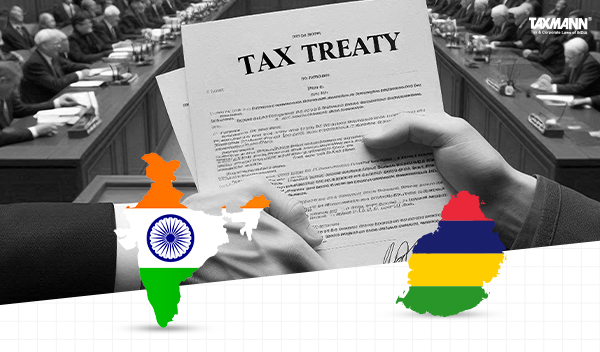[Opinion] Is the India Mauritius Tax Treaty Out of the Treaty Shopping List?
- Blog|News|International Tax|
- 2 Min Read
- By Taxmann
- |
- Last Updated on 13 September, 2024

Ameet Baid, Pragya Bansal & Saahil Mehra – [2024] 166 taxmann.com 299 (Article)
1. A battle against tax treaty abuse
Cross-border transactions have gained momentum across geographies.
Multinational enterprises (MNEs) are aggressively carving out ways and means to execute business operations in manner that yields maximum rewards.
On one hand, the local tax laws are drafted such that they aim at extracting maximum tax revenue for the respective country, while on the other hand, the provisions of the treaty provide a cushion to the taxpayer(s), undue advantage of which is leveraged by the taxpayers – a concept known as “Treaty-Shopping”.
2. What is Treaty Shopping?
When persons who are resident of a third country, attempt to take benefit of a Tax Treaty between two other countries, it can be construed as a case of Treaty Shopping.
To counter Treaty Shopping, OECD vide its Base Erosion and Profit Shifting Action (‘BEPS’) Plan 6 contains a three-branched approach to address Treaty Shopping issue:
- Contracting countries entering into Tax Treaty have no intention to create opportunities for Treaty Shopping;
- Specific Anti-Abuse provisions of LOB rule based on the Limitation-on-benefits (‘LOB’) provisions based on the legal nature, ownership in, and general activities of, residents of contracting countries;
- Even general anti-abuse rule based on the Principal Purpose(s) of transactions, known as Principal Purpose Test (PPT) to address issues of tax benefit of Treaty provisions which are not on ordinary course.
3. PPT – A subjective and strict watchman
3.1 LOB
The LOB clause finds its place in various treaties to ensure only genuine residents, who have a substantive economic presence in their home country, can claim benefits under the Treaty. It helps prevent Treaty exploitation by entities with no real economic connection to the concerned contracting states.
3.2 PPT
PPT plugs arrangement(s) where availing benefit of the respective tax treaty is ‘one’ of the principle purposes and obtaining benefit would be contrary to the object and spirit of the Tax Treaty.
4. Comparison
It is pertinent to draw attention towards a comparison between the LOB measure and the PPT measure as flowing from the above discussion. Clearly, it may seem to the naked eye upon reading of the measures that there is no major distinction between the two anti-abuse provisions. However, upon analysis it surfaces that following are the key differences between the two:
| Simplified LOB | PPT |
| Specific anti-avoidance measure | General mechanism to address treaty abuse |
| Analysis of the taxpayers’ business activities in the state in which the taxpayer is a resident | Assess whether one of the principal purposes of a particular transaction or arrangement is to obtain tax treaty benefit |
| Limits obtaining treaty benefits to those taxpayers, that in addition to being resident, satisfy number of objective tests | No specific tests, denial of treaty benefits based on a reasonable conclusion with regard to facts of the case/transaction. |
Click Here To Read The Full Article
Disclaimer: The content/information published on the website is only for general information of the user and shall not be construed as legal advice. While the Taxmann has exercised reasonable efforts to ensure the veracity of information/content published, Taxmann shall be under no liability in any manner whatsoever for incorrect information, if any.

Taxmann Publications has a dedicated in-house Research & Editorial Team. This team consists of a team of Chartered Accountants, Company Secretaries, and Lawyers. This team works under the guidance and supervision of editor-in-chief Mr Rakesh Bhargava.
The Research and Editorial Team is responsible for developing reliable and accurate content for the readers. The team follows the six-sigma approach to achieve the benchmark of zero error in its publications and research platforms. The team ensures that the following publication guidelines are thoroughly followed while developing the content:
- The statutory material is obtained only from the authorized and reliable sources
- All the latest developments in the judicial and legislative fields are covered
- Prepare the analytical write-ups on current, controversial, and important issues to help the readers to understand the concept and its implications
- Every content published by Taxmann is complete, accurate and lucid
- All evidence-based statements are supported with proper reference to Section, Circular No., Notification No. or citations
- The golden rules of grammar, style and consistency are thoroughly followed
- Font and size that’s easy to read and remain consistent across all imprint and digital publications are applied



 CA | CS | CMA
CA | CS | CMA
